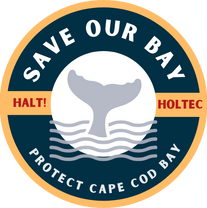Reducing Waste & Plastic Pollution
Check out this YouTube video from our January 2023 meeting with guest speaker Kathy Reyes from Beyond Plastics on the topic of plastic pollution and what you can do about it!
At Sustainable Plymouth we understand that our planet can no longer tolerate the endless stream of waste being produced in our everyday lives. Microplastics are found in our air; water; food; and bodies, as are PFAS and other bioaccumulative “forever” chemicals. Here are some resources to help you understand the issues and reduce waste.
C.A.R.E. (Creating A Responsible Environment) for the Cape & Islands – COMPOSTABLE FOOD SERVICEWARE BUYING GUIDE July 2020
Link to Polystyrene ban compliant foodware catalog – https://syscokitchen.s3./catalog-sustainable-plymouth-11210.pdf
Link to Earth friendly foodware catalog – http://www.excellentpackaging.com/catalog/bmp/biomass-bmp.html
Article/study regarding microplastics found in human placenta – https://www.sciencedirect.com/science/article/pii/S0160412020322297
Information regarding PFAS – https://www.niehs.nih.gov/health/topics/agents/pfc/index.cfm
Info regarding reducing take-out waste – https://recyclingworksma.com/Restaurant-Takeout-and-Delivery-Meals.pdf
Guide to home composting – https://www.mass.gov/doc/home-composting
We are a Plastic Pollution Coalition partner; see their “Take Action” suggestions here – https://plasticpollutioncoalition/Take-Action
Recycling
Does recycling still work? Check out this article written by Sustainable Plymouth Advisory Board member, Ken Stone: https://oldcolonymemorial-ma.newsmemory.com?selDate=20230112&goTo=A03&artid=0
Resource guides to find out what can and can’t be recycled:
Battery Recycling – more info here & here
Some generalities:
Just because you see the “chasing arrows” symbol on an item, that does not mean that it is in fact recyclable. The symbol was developed by the plastics industry after the first Earth Day celebrations to try and blunt growing concerns about plastic waste by suggesting recycling would solve the problem. Recycling alone will never do so, thought it remains important. The chasing arrows were also used in part to help recycling facilities identify what sort of plastic an item is made of.
Most plastics that come from households will be numbered 1 – PET or PETE, 2 -HDPE , 5 – PP and 6-PS . The numbers are located inside of the chasing arrows triangle and the letters are underneath. When it comes to the bottles and rigid containers that go in your recycling bin, big brand owners and local companies alike can’t get enough of the rigid #1s, 2s, and 5s to replace petroleum-based ‘virgin’ material. New laws in four states will soon require it.
Cardboard, paper, glass and aluminum are very recyclable in addition to number 1, 2 and 5 plastics.
Those companies that collect the materials in bins for plastic bags at supermarkets will also like all sorts of film plastic such as bubble wrap, bread bags, dry cleaning bags, newspaper sleeves, produce bags, case overwrap and food storage bags. Just try to remove paper labels if any are attached. Some categories of plastics cannot be recycled. Polystyrene (PS – 6) is not recycled in either its rigid (think take-out food containers) or foam (think a.k.a Styrofoam) forms. A good number of the rigid take-out containers used by restaurants are PS and should be thrown out. On the other hand, many establishments use containers made of one of the other materials that are recyclable. So just take a moment to examine them prior to disposal or recycling.
Black plastics are not recycled (the optical sorting machines can’t read them and black is too saturated a color to be mixed with other recycled plastics). So regardless of what type of plastic a black item is made of, just throw it out. Straws and plastic utensils are also trash as are cardboard milk and juice containers and most all beverage cups made of paper that are lined with a thin layer of plastic coating to prevent leakage.
Textiles are now banned from the waste stream by MA Regulations. Here are some options for responsibly donating, recycling, and buying clothing and other textiles.
Donating and Recycling Used Clothing & Textiles
Accepts usable clothing only:
- Christ Church Thrift Shoppe – 6 Lothrop Street
- Plymouth Recovery Center – 5 Main Street Extension
- Savers – 10 Pilgrim Hill Road
- Plymouth Area Coalition for the Homeless – Family and Individual Resource (FAIR) Program – 149 Bishop’s Highway, Kingston (call first 781-582-2010)
- Vineyard Church – Careworks Vineyard Resource Center – 41 Pottle Street, Kingston
Accepts textiles for recycling in addition to usable clothing:
- Bay State Textiles donation boxes at Plymouth Public Schools and Manomet Transfer Station (Accepts clothing, linens, and other textiles as well as footwear, handbags, pillows, and stuffed animals. Donates funds to schools for every ton recycled.)
- Planet Aid donation boxes – 700 State Road
- Goodwill donation boxes – 250 Beaver Dam Road (Manomet Transfer Station)
- Salvation Army donation boxes – 52 Long Pond Road and 250 Beaver Dam Road (Manomet Transfer Station)
Resources for Selling, Donating and Recycling old clothing thanks to Lulu’s (and Callie): HERE
MATTRESSESS ARE NOW BANNED FROM DISPOSAL IN TRASH AS OF 11/1/2022 (More info)
How can I find a convenient outlet to recycle my mattress?
-
- If you buy a new mattress, most stores will remove and dispose of your old one for a
reasonable fee. - You can contact the South Shore Recycling Collaborative at : https://ssrcoop.info/ – they have held periodic collections of mattresses at a reduced rate.
- Mattresses are taken at the Hard to Manage Waste Facility located directly adjacent to the Transfer Station at 354 Beaver Dam Road. The fee is $75 plus weight is the cost of disposal.
- You may also want to visit MassDEP’s mattress recycling webpage: HERE
- You could search MassDEP’s Beyond the Bin recycling directory for organizations near you that accept mattresses for donation and reuse: https://tinyurl.com/massbtb
- Finally, you can search for cleanout companies near you that may collect materials such as mattresses.
- If you buy a new mattress, most stores will remove and dispose of your old one for a
TERRA CYCLE
TerraCycle is a private company that develops ways to collect and recycle trash that is not generally accepted by traditional municipal recycling services, including cigarette butts, toys, mascara wands, and much more. TerraCycle can recycle the hard-to-recycle because we work with brands, retailers, and other stakeholders who fund the recycling process. Their free recycling programs are sponsored by concerned stakeholders so you can recycle for free. It’s a way for them to take voluntary responsibility over this important externality. Learn more and find local participating organizations here!
FOUR CORNERS SUPPLY (Hanover, MA) & ZERO REFILLS (Cohassett, MA)
Both Four Corners Supply (Hanover) & Zero Refills (Cohasset) provide unique recycling programs which you can read more about here & here
Responsible Buying
Plymouth Area “Refillery” locations:
A refillery is a retail store designed to help you reduce your single-use plastic consumption by offering the option to reuse and refill your own containers again and again with household and personal care products.
- Four Corners Supply – 144 Broadway, Hanover
- Z.E.R.O. Refills – 130 King St Cohasset
- Refill-Able (New Again Inc.) – 160 North Main St Rt 58 Carver – zero waste, refillery and upcycled art gallery – works with adults with developmental disabilities
- Green Road Refill – 2655 Main St Brewster – they also have a mobile unit that goes to farmers markets and events across the cape
Second-hand Clothing Shops in Plymouth Area:
- SHARE – 3 Proprietors Dr Unit 5, Marshfield (also has items for rent!)
Consignment & clothing rentals. The mission of SHARE is to redefine the role of retail in our everyday lives. At SHARE we hope to respectfully encourage our customers to discover the circular fashion approach to build their clothing collections.
- Christ Church Thrift Shoppe – 6 Lothrop Street
Sells gently used men’s, women’s, and children’s clothing as well as housewares
- Bethesda House Boutique – 101 Kingston Collection Way, Kingston
Baby and children’s clothing and toys resale boutique supporting young pregnant and parenting mothers and their babies
- Savers – 10 Pilgrim Hill Road
Sells used men’s, women’s, and children’s clothing as well as housewares
- Style Unlimited – 62 Court Street
Consignment shop for gently worn women’s clothing & accessories
- Upscale ReSail – 29 North Street
Upscale women’s resale boutique selling clothing & accessories (as well as home décor, small furniture, artisan crafts, and art)
- 3 Sisters Consignments – 2289 State Road
- Joanne’s Second Chance Consignment Shop – 10 Saint Margaret’s Street, Buzzards Bay
- The Gallery Consignment Shoppe – 247 Main Street, Wareham
- My Fair Lady Consignment Boutique – 119 Wareham Road, Marion
Resources for Selling, Donating and Recycling old clothing thanks to Lulu’s (and Callie): HERE
Second-hand Clothing Apps:
- Letgo
- Mercari
- Poshmark
- Thredup
- Vinted
Alternatives to Buying:
The “Buy Nothing” Project:
Shopping Guides
Home Green Guide – Thank you to Ms. Platt, Jessica, Jocelyn, Adam and Madalyn all the way from Alabama for this resource suggestion 🙂
Guide to Shopping Green – Thank you Amelia & Ms. Pedersen from StudyMAP for sharing this fantastic resource!
Pollinators, Gardening and Habitat Resources
We are sharing some links below to help you learn more about local native plants to our region as well as how you can help support our insects and pollinators on which our food-web and ecosystem depend. Also included below are some resources to help with identifying food growing naturally around you and learning to grow plants in a sustainable way.
SEMPBA has shared their native plant guide with us. See it here. Thanks SEMPBA!
Check out this guide from Native Seeds/S.E.A.R.C.H. for how to grow a Three Sisters (companion planting) garden.
This link from WildEdible.com contains material to help you identify wild food sources.
Visit this link to FreePermaculture.com for a free full Permaculture course offered by Permaculture Women’s Guild. Permaculture is a regenerative system designed by observing Nature and Indigenous ways of agriculture. It has 3 main principles: Earth Care, People Care, Future Care.
This link to SARE.org leads to A Free Handbook for Beekeepers, Growers and Conservationists.
Plymouth Office of Planning & Development: Plymouth Pollinator Protection Plan
MA Dept. of Agricultural Resources: Choosing Pollinator-Friendly Native Plants in Home Gardening or Landscaping
Mass Audubon: Plant a Native Pollinator Garden
Plant THIS not THAT (Blue Stem Natives – MA natives) – Visual resource of 21 commonly planted but non-native plants, you click on the image and see list of comparable looking native alternatives
Ohio State University Pollinator Habitat 101 – free recordings & resources
MA Office of Coastal Zone Management
Wampanoag Horticultural Practices in an English Garden
What is Backyard Permaculture? Sustainable Plymouth PowerPoint
Check out this informative presentation, “Diversify Your Lawn” put on by the Plymouth Public Library!
Plymouth Guide of Invasive Plants
Looking for the best source of wildflower seeds to plant on your property? Town of Plymouth’s Dept of Marine & Environmental Affairs recommends New England Wetland Plants (they ship!) https://newp.com/seed-mixes/
If you’re looking for a local native plant nursery, check out Blue Stem Natives in Norwell.
Tips on how the general public can use wetlands laws in Massachusetts: https://savethepinebarrens.
Plymouth Public Library presentation about raised garden beds: https://drive.google.
- Native Plants Recommended for Homeowners & Planners in Plymouth County, MA – click here for the Southeastern Massachusetts Pine Barrens Alliance detailed guide on recommended native plantings for Plymouth – includes pictures and descriptions of recommendations
- Plymouth Pollinator Protection Plan – click here for a Plymouth-specific guide to increasing pollinator habitats including what native species to plant in your backyard or container garden – includes pictures and descriptions of recommendations
- Plant This not That – click here for an interactive way to learn how to replace popular non-native ornamental plants with highly beneficial and beautiful native alternatives
- Looking to purchase wildflower seeds and native plants? – visit the NE Wetlands Plants and Blue Stem Native websites
- Certified Wildlife Habitat – click here to learn about how to get your lawn, container garden, schoolyard, work landscape or roadside greenspace certified as a welcoming safe-haven for local wildlife
- Pollinator Habitat 101 – click here to enjoy a 5 part series about pollinators, habitat and how your backyard is part of our ecosystem
- Nature’s Partners; Pollinators, Plants & You – click here for comprehensive pollinator curriculum for grades 3-6 or your own education, includes lessons and activities
- Project Wingspan; Pollinator Habitat webinars – click here to sign up for free webinars to learn more detailed/technical information about habitat restoration
- DCR guidance: here and here
- GROW Massachusetts “What should I plant for pollinators?”
- MDAR Native Pollinator Plant Database
Open Space
What is GIS? GIS is a technology that is used to create, manage, analyze, and map all types of data.
The Plymouth Open Space Committee put together this fantastic guide of trails throughout town conservation land: https://www.plymouth-ma.gov/sites/g/files/vyhlif3691/f/uploads/2022plymouth_trail_guide.pdf
Learn more about access and equity from Wildlands Trust in this blog article Advancing Racial Equity in Southeastern MA & Beyond
Check out the Pine Hills Area Trail System project here: https://www.phats.info/
Learn more about the great work Save the Pine Barrens is doing with their Community Land & Water Coalition: https://savethepinebarrens.org/
Hiking Trails along Fields and Forests above the Plymouth / Carver Aquifer: Plymouth Aquifer Hiking
Chapter 61: Tax Advantages for Land Use Preservation
If you are a Massachusetts property owner with five or more contiguous acres of land, you may have a unique opportunity to lower property taxes by committing to keep at least part of your land undeveloped for a certain period of time. The State’s Chapter 61 Current Use Tax Programs offer financial advantages for preserving qualified land that is currently used for forestry (Chapter 61), agriculture (Chapter 61A), or open space and recreation (Chapter 61B).
In addition to tax benefits, a Chapter 61 program can help you realize your long-term vision for your land, especially if you are considering it as a legacy you’d like to leave for future generations.
To explore this opportunity, click here to get started.
For information about the Town of Plymouth Chapter 61 Application Process, click here.
If you have questions or would like to discuss your options, please contact Patrick Farah at PFarah@plymouth-ma.gov
- Protecting Your Legacy: A Massachusetts landowner’s guide to conservation-based estate planning – https://masswoods.org/sites/
default/files/pdf-doc-ppt/PYL- Revised-2020.pdf - Your land, Your legacy: Deciding the Future of Your Land to Meet the Needs of You and Your Family https://masskeystone.
net/sites/masskeystone.net/ files/pdf-doc-ppt/ylyl_web.pdf - Commonwealth Conservation Land Tax Credit (CLTC) https://www.mass.gov/
service-details/commonwealth- conservation-land-tax-credit- cltc - Conservation based estate planning can help you and your family save on taxes! https://masswoods.org/
estate-planning-professionals/ taxes-and-tax-incentives
**Thank you to the Plymouth Open Space Committee for this information**
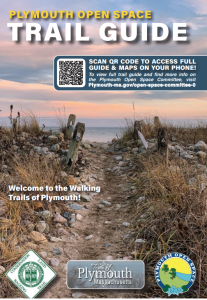

Climate Resiliency and Decarbonization Resources
Learn about the Read Up a Storm! collaborative “community read”!
The book list can be found HERE.
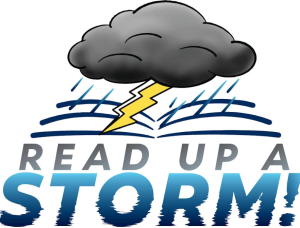
Sustainable Plymouth’s Webinar on the IPCC report and climate action locally Link to Webinar
Understanding Coastal Sea Level Rise, by Sara P Grady, Ph.D. Link to Presentation
For more information on sea level rise visit Climate Central https://sealevel.climatecentral.org/
Visit Project Drawdown for educational resources, such as this video on Climate Change https://www.drawdown.org/climate-solutions-101/unit-2-how-to-stop-climate-change
Three times the amount of carbon in the atmosphere is stored in soil. Composting helps to sequester carbon. For a short video see here: “The Compost Story” by Kiss The Ground
The Commonwealth of Massachusetts has completed its Decarbonization Roadmap.
See the plan here: https://www.mass.gov/doc/ma-2050-decarbonization-roadmap/download
Find the Town of Plymouth Planning Board’s Climate Resources (including
Climate Ready Healthy Plymouth Report) here:
See Plymouth Open Space Committee’s Climate Change Resiliency Addendum here: https://www.plymouth-ma.gov/sites/g/files/vyhlif3691/f/uploads/jan_11_2021_plan_final.pdf
Energy Conservation and Renewable Energy
For an overview of Energy Efficiency Incentives please click HERE for a summary.
Sign up for a no-cost Energy Assessment through MassSave here: https://www.masssave.com/en/saving/
If you are not on Plymouth’s money-saving municipal aggregation program, you’re paying way too much for your electricity! Learn about the Community Choice Power Supply Program explains Plymouth’s money-saving municipal aggregation program and option to choose 100% renewable energy for your electricity supply for just pennies more a month.
How to Go Electric – presentation by Hingham Net Zero
Energy Switch Massachusetts This MA Dept. of Public Utilities site lists all electricity supply options for Plymouth residents and small businesses.
MA Clean Energy Center: Massachusetts Residential Guide to Solar Energy
MA Clean Energy Center: Massachusetts Commercial Solar: How It Works & Available Incentives
For a webinar hosted by Sustainable Plymouth, featuring Phil Angell, that goes over details on switching to renewable energy see here:
Water Conservation
We’ve created the below graphic to help inform the community as to ways we can conserve water. Feel free to share it.
For more suggestions click here: https://wateruseitwisely.com/100-ways-to-conserve/
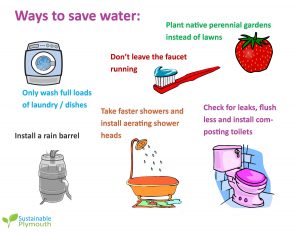
Civic Engagement
Sustainable Plymouth has put together a one page document with links to help Plymouth residents reach their elected officials, as well as town departments, boards and committees.
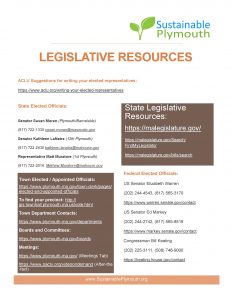
Please click the link below to view the video from the Plymouth Area LWV on how to run for office. Thank you to the LWV for giving us permission to share their video!
Plymouth Area League of Women Voters presents “How to Run for Office” Forum. Copyright PACTV. Many Thanks to PACTV for videoing, editing, airing and providing this video to share. We hope you find it informative.



